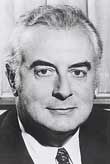Gough Whitlam: first Prime Minister for Aboriginal Affairs
21 October 2014
 LETTER TO THE EDITOR
LETTER TO THE EDITOR
Sir – The Aboriginal flag outside the Central Land Council in Alice Springs is flying at half mast today as Central Australian Aboriginal people mourn the passing of Australia’s 21st Prime Minister, Edward Gough Whitlam.
Mr Whitlam was really Australia’s first Prime Minister for Aboriginal Affairs. I met him in 2001. He didn’t need to give himself that name because we all know that’s who he was.
There are so many Whitlams in our communities who have been given that name in his honour. It shows how many people still like and remember him.
He was a good and straightforward man and many people are very grateful for the land rights he gave to us.
The much loved former leader passed away at a critical time for Aboriginal land rights.
The Aboriginal Land Rights Act Mr Whitlam was preparing to bring in before he was sacked is again under attack from all the usual suspects. It is doubly sad for this great man to leave us just as his most enduring achievement is once again under threat.”
The legislation initiated by Mr Whitlam gave Aboriginal people something they had been denied since the arrival of Europeans: power.
We owe it to him that we have the power to control what happens on our land and have some measure of control over our lives.
Our thoughts are with his family and friends at this sad time.
Francis Kelly, Chairman
David Ross, CEO
Central Land Council



While Mr Whitlam can certainly lay some claim to being instrumental to the Land Rights Act and while most certainly being a figure of immense proportions in the Australian political landscape, Gough was not responsible for granting Land rights!
That honor lies with the Australian people through their Parliament and at the time the act was passed the Prime Minister of that Parliament was in fact Malcolm Fraser.
So perhaps while acknowledging the contributions of Gough it should be noted that the Land Rights Act came into being through the good will and intentions of both sides of the political spectrum.
It will also only be “Non Partisan” goodwill that will eventually see a referendum recognizing Aboriginal equality, culture and prior occupation.
Take a step back, look at the tributes pouring in for Gough from both sides of politics, perhaps the real lesson is there! While paying our respects lets keep in mind, division is so much easier to create than harmony.
When it comes to referendums, united we succeed, divided we fail.
On 1 January 1911, a decade after federation, the Northern Territory was transferred to Commonwealth control separating it from South Australia through the Northern Territory Surrender Act 1908 by South Australia and the Commonwealth’s federal Northern Territory Acceptance Act 1910.
While the Commonwealth then regularly claimed to lack authority or power to pass laws effecting “Aborigines” the Commonwealth still managed to continue passing various laws and regulations imposing apartheid, terminating otherwise held rights of Australian citizens, by identifying them as being Aboriginal within the Commonwealth’s Northern Territory.
The Commonwealth proclaimed in 1941 the Haasts Bluff Aboriginal Reserve, purportedly to protect Aborigines by denying them their rights as Australians. As were other such reserves in the Northern Territory, as well as those found all around Australia.
Most were established to deny self-management as well as otherwise held rights as Australians.
The 1967 Referenda re s.51(xxvi) was legislation by Australians voters to extinguish, to eliminate all legislation which segregated, denied basic rights, using racist discriminations upon Australians, particularly when used to deny Australians also labeled as Aborigines their rights and their responsibilities as Australians.
The Commonwealth continues deliberately misleading attempts to persuade Australians their 1967 voting was to enable wider discrimination between Australians on grounds of race.
Commonwealth racism remains the problem, not the solution.
@ Paul Parker.
My understanding is that Ps Friedrich and Frieda Albrecht established Haasts Bluff as an outstation of Hermannsburg Mission which was a refuge from depredation by some pastoralists, police and payback.
Haasts Bluff Reserve was later gazetted under the Terra Nullius regime, which Land Rights overturned to some extent, Native Title included.
When Mission organisations handed control to Aboriginal councils during the 1970s, government had freer access, e.g. the Qld sacking of Mapoon to enable bauxite mining and the policy of Self-Determination.
The forthcoming Constitutional referendum is another form of recognition on the long march to democratic equality, but responsibility within a cultural framework is fractious for obvious reasons.
The Commonwealth has work to do in reforming welfare, job creation and working with Indigenous cultures.
The present Australian cultural amnesia may be invigorated by this process. I stand to be corrected on the above.